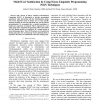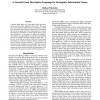34 search results - page 2 / 7 » Adapting Game-Playing Agents to Game Requirements |
DIMEA
2007
13 years 9 months ago
2007
The concept of Player Adaptive Entertainment Computing (PAEC) is introduced to provide personalized experiences when interacting with the entertainment media. Two of the important ...
AAAI
2011
12 years 5 months ago
2011
Automated agents for electricity markets, social networks, and other distributed networks must repeatedly interact with other intelligent agents, often without observing associate...
AAAI
2010
13 years 6 months ago
2010
A General Game Player is a system that can play previously unknown games given nothing but their rules. The Game Description Language (GDL) has been developed as a highlevel knowl...
AI
2004
Springer
13 years 5 months ago
2004
Springer
Efficient Learning Equilibrium (ELE) is a natural solution concept for multi-agent encounters with incomplete information. It requires the learning algorithms themselves to be in ...
CIG
2005
IEEE
13 years 11 months ago
2005
IEEE
TRACS (Tool for Research on Adaptive Cognitive Strategies) is a new suite of card games played with a special deck, where the back of each card is a clue to the front of the card. ...


